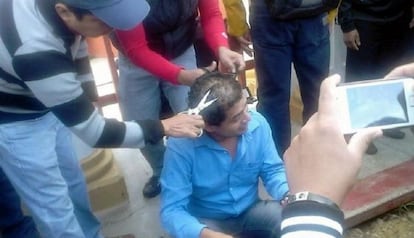Mexican teachers bound and shaved for following education reform
Radical groups opposed to new law target educators applying for vacancies


Violent protests that broke out in several Mexican states last month over President Enrique Peña Nieto’s controversial education reform have reached new heights with radical groups now chasing down teachers who try to comply with the new law.
In recent days, dozens of teachers have been targeted by hardline members of the powerful National Coordinating Committee of Education Workers (CNTE) union when they try to cross picket lines to take the now-required evaluation test or simply apply to fill classroom vacancies.
Teachers are targeted for taking the now-required evaluation test or simply submitting an application
The group’s latest strategy has led to a string of attacks against teachers and their supporters, who sometimes end up with their hands tied and heads shaved. Many of the incidents are also photographed or filmed.
“Why did they attack me and put me on display?” asked a teary-eyed Nayeli Mijangos, one of the few victims who spoke publicly after she was attacked last weekend in Tuxla Gutiérrez, Chiapas state. “Why did they cut off my hair? What did I do to them?”
Like many, Mijangos was unable to get a position by any of the traditional routes available before the reform came into force: she did not study at one of the radical left-controlled rural teaching schools, she did not have the money to pay the union to assign her a post, and no one in her family had been a teacher, so she was unable to inherit a spot from a retiring relative as union policy had once mandated. Mijangos does, however, have a university degree, which entitles her to apply for a place, which is what she tried to do.
In a country with two million teachers and 25 million elementary school students, education has always been a sensitive subject in Mexico. Yet, the Mexican system places low in the global Programme for International Student Assessment (PISA) rankings – even behind Kazakhstan. According to some studies, at the current pace, it will take around 77 years for Mexico to reach the level of standards in science teaching found in developed countries.
In 2013, President Peña Nieto introduced a sweeping overhaul of the country’s education system as part of his far-reaching reforms aimed at restructuring and modernizing Mexico.
One controversial part of the new law requires that teachers take evaluation tests every four years. They can repeat the tests up to three times and, if they fail all the opportunities, they will be fired.
The reform, which has the support of all the major political parties, has faced fierce opposition from a sector of radical groups connected to the CNTE. Last month, violent protests broke out in Oaxaca, Chiapas, Guerrero and Michoacán states, where the union has mobilized many supporters.
For many decades the CNTE and its sister organization, the National Education Workers Union (SNTE), controlled every level of the country’s education system. By assigning classrooms, the unions were able to guarantee that teachers from the poorest backgrounds were able to provide for their families. But the old rules also created a privileged caste and cronyism became rampant.
In a country with two million teachers, education has always been a sensitive subject in Mexico
The reform has also changed the way teachers are selected. Before, graduates from the rural teaching schools, which are controlled by radical leftist sectors, were automatically assigned a classroom in their area. But now, anyone with a university teaching degree can apply for a job in any part of the country.
It is difficult to predict where these violent protests will lead. Both the unions and Mexico’s National Commission on Human Rights have publicly condemned the attacks, but their warnings seem to be falling on deaf ears.
“Not one act of intimidation by the federal government will be able to stamp out the workers’ struggle to put an end to this education reform. If they try it, the CNTE will be there in full force,” said one union official.
The CNTE, which is considered a de facto power in Mexico’s southern states, has a long tradition of organizing boycotts and violent attacks.
The CNTE has a long tradition of organizing boycotts and violent attacks in the southern states
Just before the June 7 midterm elections, radical groups blocked highways, took over airports, and set fire to local election headquarters. The Peña Nieto government was forced to suspend the reform one week before the race to avoid more violence, but then restarted the process soon after.
But the violence has now flared beyond government institutions and is being aimed directly at teachers who are trying to follow the new law.
Justifying the head-shavings and public humiliations, the CNTE has charged that the victims are in fact police infiltrators.
“Is it not a provocation when police try to infiltrate a group?” asked one CNTE spokesman. “Even so, very little happens to them. But they need to quit interfering otherwise they will be stripped, tied and subjected to humiliation.”
English version by Martin Delfin.
Tu suscripción se está usando en otro dispositivo
¿Quieres añadir otro usuario a tu suscripción?
Si continúas leyendo en este dispositivo, no se podrá leer en el otro.
FlechaTu suscripción se está usando en otro dispositivo y solo puedes acceder a EL PAÍS desde un dispositivo a la vez.
Si quieres compartir tu cuenta, cambia tu suscripción a la modalidad Premium, así podrás añadir otro usuario. Cada uno accederá con su propia cuenta de email, lo que os permitirá personalizar vuestra experiencia en EL PAÍS.
¿Tienes una suscripción de empresa? Accede aquí para contratar más cuentas.
En el caso de no saber quién está usando tu cuenta, te recomendamos cambiar tu contraseña aquí.
Si decides continuar compartiendo tu cuenta, este mensaje se mostrará en tu dispositivo y en el de la otra persona que está usando tu cuenta de forma indefinida, afectando a tu experiencia de lectura. Puedes consultar aquí los términos y condiciones de la suscripción digital.








































